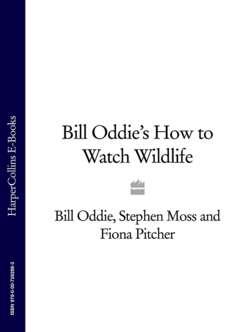Читать книгу Bill Oddie’s How to Watch Wildlife - Stephen Moss - Страница 11
ОглавлениеB
Getting help
When you start watching wildlife, it can be really helpful to go out with someone who knows a lot more about the subject than you. Finding a friend or professional guide is one of the best ways to learn more about the subject – enabling you to test out your knowledge and learn from their experience. It’s also very rewarding for your guide: after all, it’s always enjoyable to pass on knowledge to someone else, so you will hopefully both get something out of the experience.
You may already know someone who is interested in wildlife – perhaps a friend, neighbour or work colleague. Don’t be embarrassed to ask them to take you out; they will almost certainly be flattered.
If you don’t have any wildlife experts in your social circle, then there are professional guides, especially in wildlife hotspots such as north Norfolk, the Isles of Scilly and Speyside. They may advertise in the local paper or the wildlife trust or Royal Society for the Protection of Birds (RSPB) magazines; otherwise, ask at any nature reserve. You can also join guided walks at many reserves, which are an excellent way to meet fellow beginners as well as see plenty of wildlife.
Joining a group or club
The next step is to join a local group or club, such as a natural history society or bird club, or local RSPB members’ group, which can be found throughout the country.
Most clubs and societies hold regular indoor meetings (usually from September to March or April), with a monthly talk by a member or guest speaker. Many also run outdoor meetings, such as a walk around a local nature reserve, park or other wildlife site; as well as excursions to more distant places by coach or car. This is a great way to meet like-minded people, and expand your horizons and experiences.
To find out about your local club or society, ask at your nearest library, check out the internet, or, for your local RSPB members’ groups, contact the society direct (www.rspb.org.uk).
Using the internet to get info
In the days before the internet came into being, finding out about opportunities for wildlife watching was a time-consuming and often frustrating process. Nowadays, the internet provides all kinds of ways to find out information and make contact with others:
Websites of official organisations: All major organisations, including the RSPB (www.rspb.org.uk) and wildlife trusts (www.wildlifetrusts.org), now have excellent websites. Each of these also has links to other sites you may not have heard of. And don’t forget that the BBC’s own website (www.bbc.co.uk/nature) is packed with information about opportunities for wildlife watching. It includes sections on British wildlife, a messageboard where you can have online conversations with other people on a range of topics, and, of course, wildlife television programmes.
Specialist organisations: Almost every kind of wildlife has its own organisation nowadays, from the Mammal Society (www.abdn.ac.uk/ mammal) and Bat Conservation Trust (www.bats.org.uk) to plantlife (www.plantlife.org.uk) and the British Dragonfly Society (www.dragonflysoc.org.uk).
Search engines: Use a search engine such as Google or Yahoo to find contacts, get online reports about a particular site or area, or just to browse and see what you can find.
User groups: There are web user groups for every possible kind of enthusiast, including everything and anything to do with natural history. Again, browse around until you find a group of like-minded people to ‘chat’ with.
Commercial sites: You can order virtually anything on the web – including, of course, books, CDs, trip reports, wildlife food and feeders and optical equipment – and all delivered straight to your door. Check out www.subbuteo.co.uk and www.nhbs.com – both excellent specialist sites for wildlife books, etc.
Enthusiast sites: Some of the very best sites on the web are those set up by enthusiasts. You can also often find trip reports posted by other wildlife watchers – just key in, for example, ‘bird trip report Suffolk’ and see what you can find.
Bill's top tips
_ When searching the internet, remember to click the ‘UK only’ button or the number of sites the search comes up with can be overwhelming.
_ Also be careful when entering words or phrases that may have a double meaning: for example, avoid putting in ‘sex’, ‘tit’ or even ‘wild life’, as you may be directed to sites of a more ‘adult’ nature …
